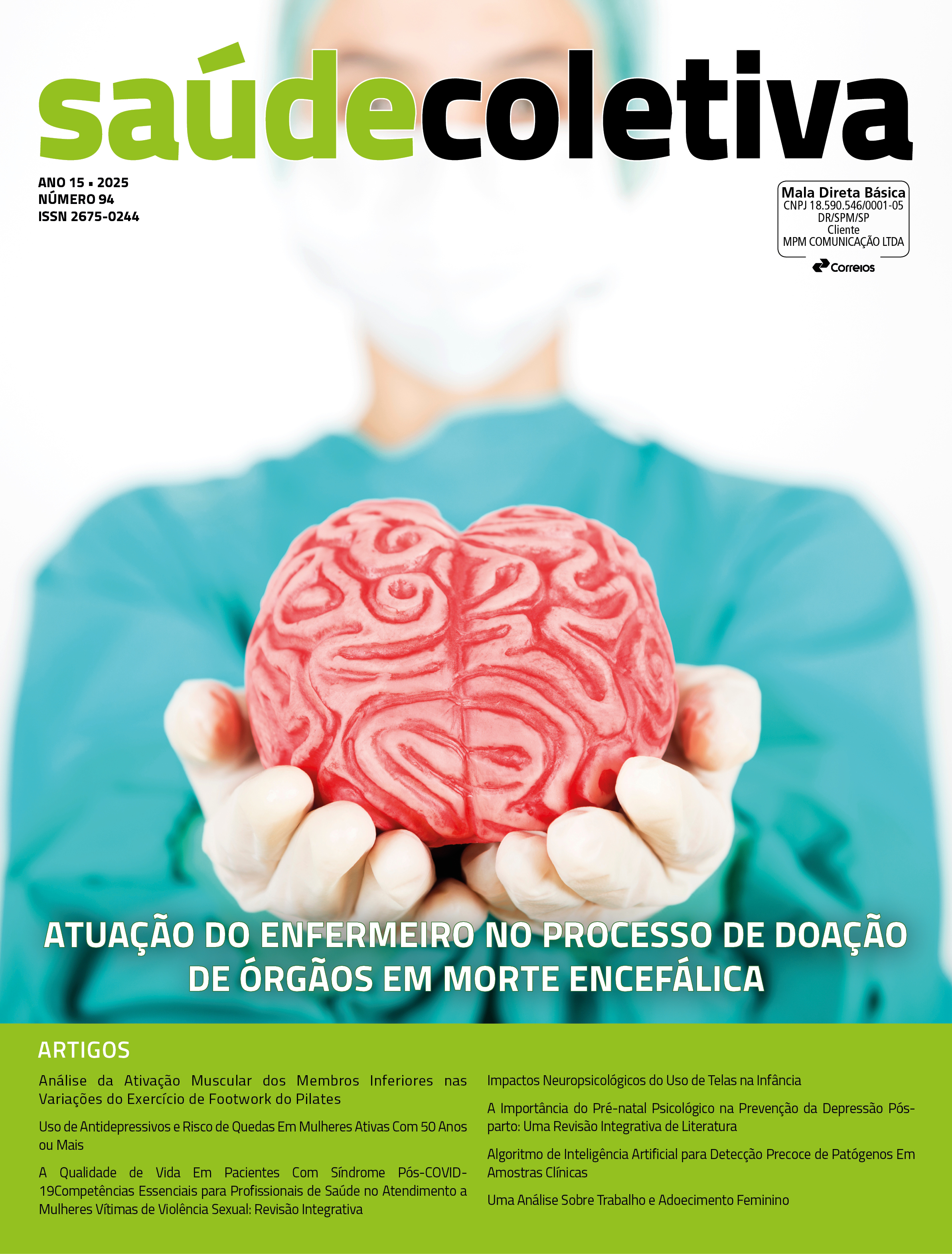Analysis of the Family Functionality of University Students During the Covid-19 Pandemic
DOI:
https://doi.org/10.36489/saudecoletiva.2025v15i94p14929-14938Keywords:
Family Relationships, Students, Universities, COVID-19, Cross-Sectional StudiesAbstract
Objective: To analyze the family functionality of university students during the COVID-19 pandemic. Method: Cross-sectional study with 251 students, using an online questionnaire to obtain information about sociodemographic profile and family functionality, evaluated through the Family APGAR. Results: The majority of the students were female, with an average age of 23.8 years, self-declared as non-white, enrolled in their first undergraduate program, not from the university's host city, living in a non-owned house with their father and/or mother, and belonging to the Christian religion. There was a higher prevalence of students belonging to families with good family functionality (94; 37.5%; 95% CI 31.1-43.8), followed by high family dysfunction (88; 35.1%; 95% CI 29.5-41.4). Regarding the domains of the Family APGAR, "Growth" (Development/growth) and "Resolve" (Problem-solving/shared time), were highlighted with 79.8% and 77.7% in functional families, respectively. Conclusion: University students received family support, especially during the COVID-19 pandemic period.
References
World Health Organization. Origin of SARS-CoV-2. [internet] 2020. [acesso em 24 Mar 2024]. Disponível em: https://iris.who.int/bitstream/handle/10665/332197/WHO-2019-nCoV-FAQ-Virus_origin-2020.1-eng.pdf.
World Health Organization. WHO Director-General's statement on IHR Emergency Committee on Novel Coronavirus (2019-nCoV). [internet] 2020. [acesso em 24 Mar 2024]. Disponível em: https://www.who.int/director-general/speeches/detail/who-director-general-s-statement-on-ihr-emergency-committee-on-novel-coronavirus-(2019-ncov).
Brasil. Ministério da saúde. Secretaria de Ciência, Tecnologia, Inovação e Insumos Estratégicos em Saúde - SCTIE. Diretrizes para diagnóstico e tratamento da Covid-19. 2020. Versão 3. Brasília – DF.
Brasil. Portaria Nº 343, de 17 de março de 2020. Dispõe sobre a substituição das aulas presenciais por aulas em meios digitais enquanto durar a situação de pandemia do Novo Coronavírus - COVID-19. Diário Oficial da União. Brasília, DF. 2020;53:39.
Prime H, Wade M, Browne DT. Risk and resilience in family well-being during the COVID-19 pandemic. American Psychologist. 2020;75(5):631.
De Assis Lucifora C, Muzzeti LR, Reina FT. Historizing the concept of family. Revista Tempos e Espaços em Educação. 2021;14(33):7.
Schnettler B, Miranda-Zapata E, Grunert KG, Lobos G, Denegri M, Hueche C, Poblete H. Life satisfaction of university students in relation to family and food in a developing country. Frontiers in Psychology. 2017;8:1522.
Moratto Vásquez NS, Cárdenas Zuluaga N, Berbesí Fernández DY. Clima escolar y funcionalidad familiar como factores asociados a la intimidación escolar en Antioquia, Colombia. Pensamiento psicológico. 2017;15(1):63-72.
Smilkstein G. The family APGAR: a proposal for a family function test and its use by physicians. J fam pract. 1978;6(6):1231-1239.
FONAPRACE/ANDIFES. Pesquisa do Perfil Socioeconômico e Cultural e Cultural dos (as) Graduandos (as) das IFES - 2018. Brasília-DF: FONCAPRACE/ANDIFES, 2019.
Barros SCV, Mourão L. Panorama da participação feminina na educação superior, no mercado de trabalho e na sociedade. Psicologia & Sociedade. 2018;30.
Prudente EAJ. A escravização e racismo no Brasil: mazelas que ainda perduram. Jornal da USP. 2020;10.
Gonçalves F, Benardino S. O Contributo da Lei de Cotas na Redução das Desigualdades Sociais. RPER. 2021;58:83-100.
Fiorini MC, Moré CLOO, Bardagi MP. Família e desenvolvimento de carreira de jovens adultos no contexto brasileiro: revisão integrativa. Revista Brasileira de Orientação Profissional. 2017;18(1):43-55.
Marchini DMF, Chaves LB, Souza TF, Silva MVC, Oliveira CF, Lipp MEN, Pinto ML. Análise de estresse e qualidade de vida em alunos universitários. Revista de Administração Unimep. 2019;17(3):141-164.
Vizzotto MM, De Jesus SN, Martins AC. Saudades de casa: indicativos de depressão, ansiedade, qualidade de vida e adaptação de estudantes universitários. Revista Psicologia e Saúde. 2017;9(1):59-73.
Fradelos EC, Kapsiocha E, Tzavella F, Kastanidou S, Tsaras K, Papagiannis D, Papathanasiou IV. Factors associated with psychological distress in university students and the relation to emotional intelligent and spirituality: A cross-sectional study. Materia socio-medica. 2019;31(4):262.
Arias-De La Torre J, et al. Psychological distress, family support and employment status in first-year university students in Spain. International journal of environmental research and public health. 2019;16(7):1209.
Torales J, et al. Self-perceived social support in medical students of the National University of Asunción, Paraguay. Educ Medica. 2018;19(3):313-7.
Munares García O, Zagaceta Guevara Z, Solís Rojas M. Función familiar y rendimiento académico en estudiantes de obstetricia de una universidad pública de Perú. Matronas prof. 2017;e1-e9.
Maia BR, Dias PC. Ansiedade, depressão e estresse em estudantes universitários: o impacto da COVID-19. Estudos de psicologia. 2020;37.
Zhen L, Nan Y, Pham B. College students coping with COVID-19: Stress-buffering effects of self-disclosure on social media and parental support. Communication Research Reports. 2021;38(1):23-31.
Zhu X, Chu CKM, Lam YC. The Predictive Effects of Family and Individual Wellbeing on University Students’ Online Learning During the COVID-19 Pandemic. Frontiers in Psychology. 2022;13.
Koelen JÁ, et al. COVID‐19 and mental health among at‐risk university students: A prospective study into risk and protective factors. International journal of methods in psychiatric research. 2022;31(1):p. e1901.
Gao H, et al. The relationship between family support and e-learning engagement in college students: the mediating role of e-learning normative consciousness and behaviors and self-efficacy. Front. Psychol. 2021;12:573779.







